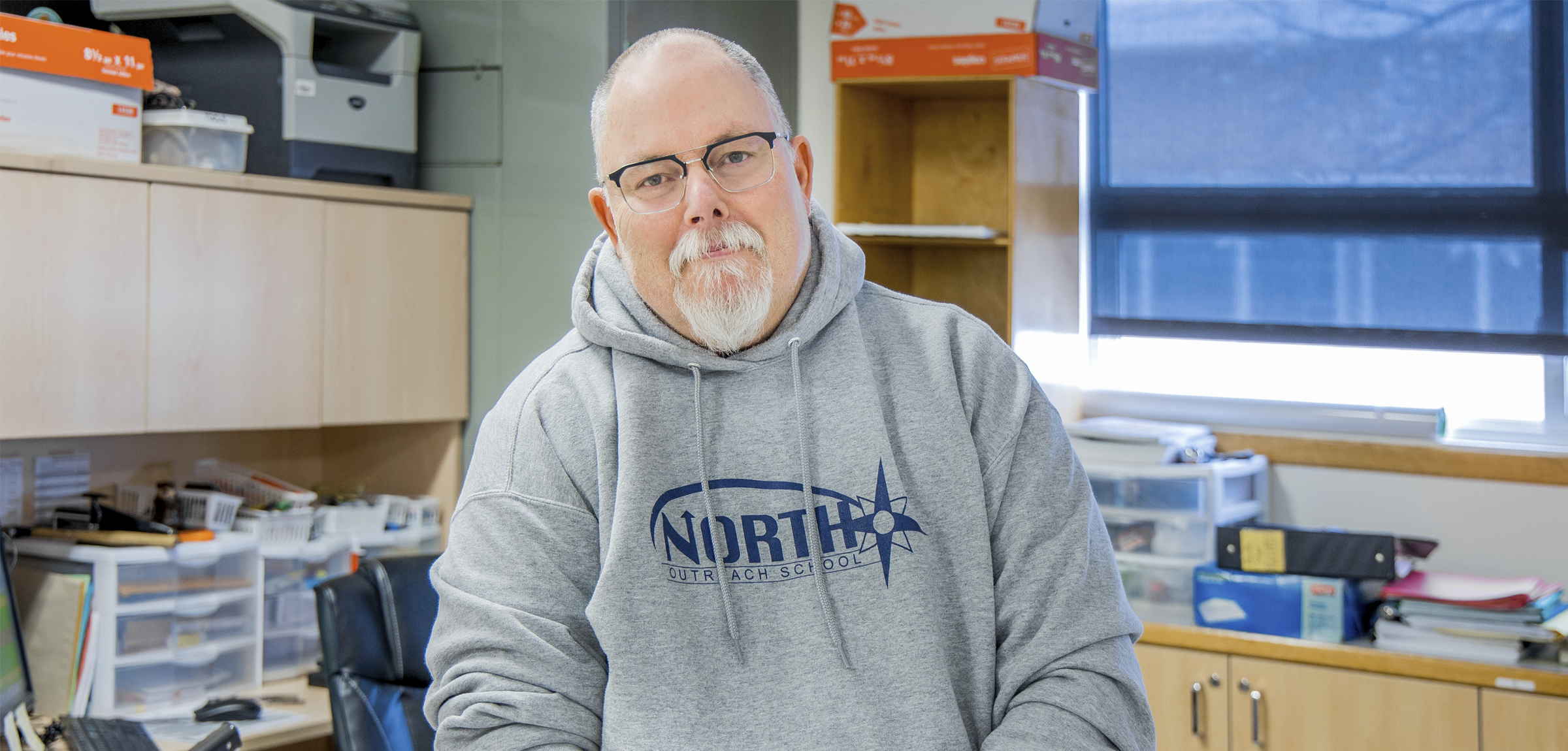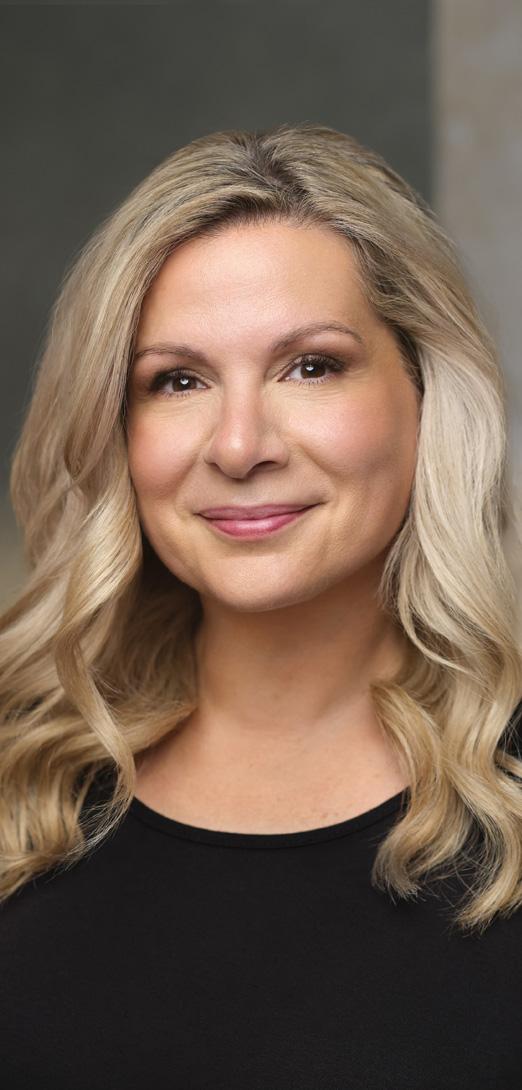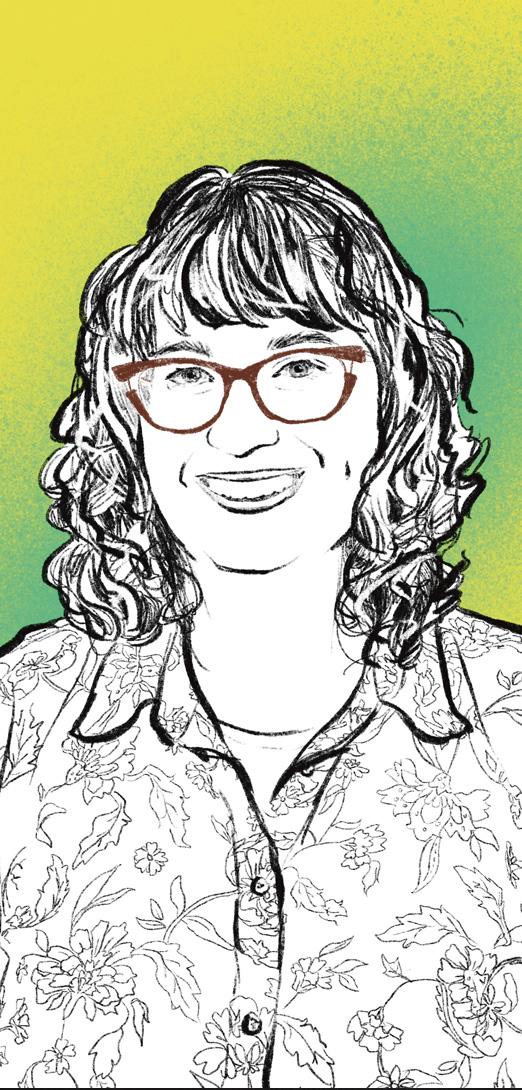Ross MacDonald
Location– North Star Outreach School Tofield
Teaching experience– 25 years
Time in current setting– 9 years
What do you teach?
All core high school courses and CTS, excluding higher level sciences and math. I also provide some guidance counselling.
How many other teachers are there in your setting?
One teacher and one amazing EA.
What is special/different/unique/interesting about your current teaching setting?
North Star Outreach (NSO) is essentially a school within a school. Located in a single classroom within Tofield School, North Star has about a dozen full-time students while also facilitating programming to more than 50 other high school students. At any given time, North Star can be delivering more than 30 high school courses.
I am more of a facilitator than a traditional classroom teacher. My EA and I do one-on-one tutorials or small group work. The course material covers all aspects of the Alberta curriculum and the courses we deliver have the same value as those done at any other Alberta school.
What do you find rewarding about teaching in this environment?
Like every teacher, I truly value our students succeeding and doing their very best. When it comes to outreach students, my idea of success is probably much different than a teacher in a “traditional” classroom. Success with outreach kids can be a student showing up to class once in two months, getting themselves checked into rehab, having a healthy baby, finding affordable and safe housing, getting government ID, getting a stable source of food, applying for and receiving government funding … those are what we consider highly successful students. Of course, academics are all part of what we do at North Star, but it’s the success in overcoming life’s true challenges that really provides us with a sense of accomplishment.
Every year NSO gives out an award for the most improved student, a small monetary award (co-sponsored by a local church) for someone who has overcome the largest hurdles and truly represents the core values of NSO. We have given this award out to a teen mom or a young man who was essentially written off by other educators as a lost cause but who successfully finished high school and spent his spare time working at local senior’s centre.
Our last recipient was a student who overcame the trauma of a serious drug ad- diction and an incredibly dangerous life on the streets. She decided to return to school, heard about North Star and came back to school to successfully complete two and a half years of high school in one year. Many of our students are also the first person in their family to ever receive a high school diploma.
What are the main challenges?
Appreciation for what we do, communication between traditional schools and outreaches, finding champions for the cause. It has always been a struggle to tell our stories and share the value we provide to help seriously at-risk students move forward and succeed.
You need to be open-minded, nonjudgmental and willing to champion all comers. You are, in all reality, their last chance.
What skills/traits/aptitudes does a teacher need to thrive in this environment?
It is essential that someone who chooses to go into outreach be a very well-rounded individual with a fair amount of life experience, someone who is passionate about helping our most vulnerable and has a deep understanding of the nuances of the Alberta curriculum. You also need to be multi-disciplined and be willing to reach out to subject specialists when you come across a challenging concept.
Outreach teachers need to know where to get the best resources and how to “stream-line” essential outcomes. You need to be open-minded, nonjudgmental and willing to champion all comers. You are, in all reality, their last chance. You must be able to actively listen and know where your boundaries are if something is disclosed to you. You will also be required to defend what you do and promote the good and challenging work outreach teachers do, including possibly standing up in court to defend a student’s character.
Can you relate a specific situation that illustrates the unique nature of your current teaching assignment?
One day when I was running the senior high side of Lakeside Outreach School in Slave Lake back in the early 2000s, a young man who was known as a notorious troublemaker and a chronic skipper randomly called the school. I answered. Knowing who it was, I of course challenged him about why he wasn’t at school. He answered that he was hunting with his grandfather.
Now, Slave Lake has a very active hunting community. There are numerous First Nation reserves in the surrounding area and hunting is a very big deal to those communities as well as to the Métis. So, knowing this, I cut the boy some slack.
He then said, “Can you please come downstairs? I have something I want to show you.”
I went downstairs and he greeted me with the biggest grin. I had never seen so much joy in the young man. He called me over to his pickup. He was vibrating in anticipation. He lifted up a blood-soaked tarp and exclaimed, “My first kill, Micky D (my nickname). My first kill!” It was an eight- point mule deer—impressive!
Now, this may seem morbid if not horrific to some—the celebration of killing a wild animal—but to the Métis and First Nation communities, it’s an honour for someone to share their first kill with you— an honour. It’s like a rite of passage. That’s what I consider a true, heartfelt reward. That young man thought enough of me and what our outreach program provided him that he had to show me the outcome of his first successful hunt.
Outreach schools provide
educational alternative and supports
54/63school authorities in Alberta provide outreach programs |
100outreach sites operate in Alberta |
9,000students are enrolled at outreach schools for the 2023/24 year |
|
An outreach program provides an educational alternative for junior and senior high school students who find that traditional school settings do not meet their needs. Each outreach program is unique and is designed to meet the individual needs of its students. —Alberta Education |
||



